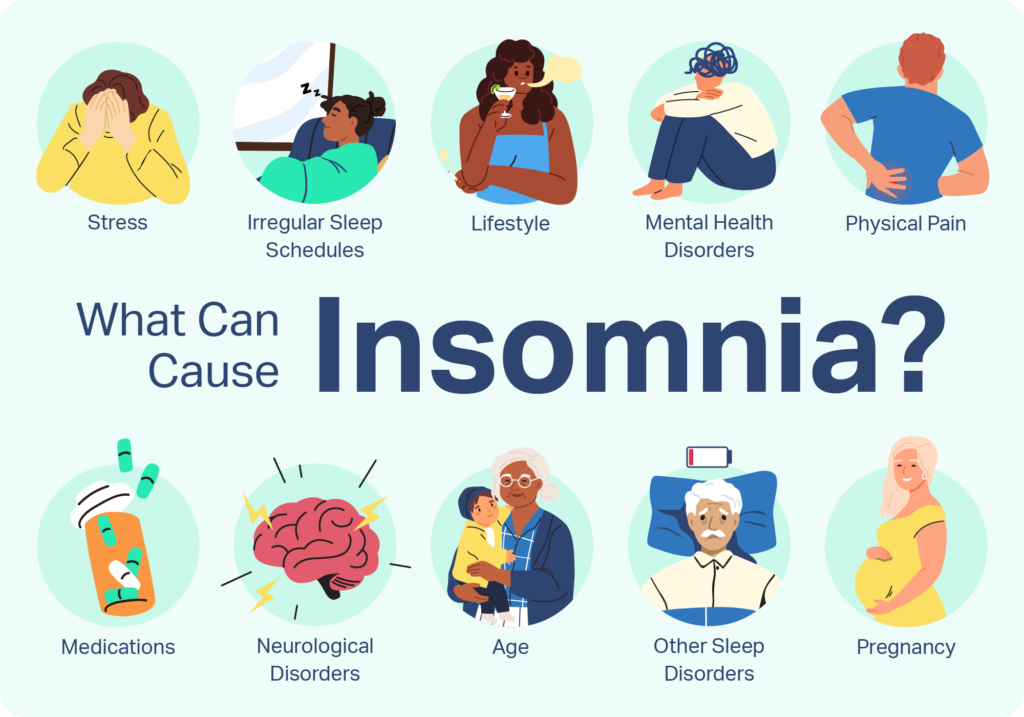Can’t sleep? Tossing and turning all night? Well, you’re not alone. Insomnia is a common sleep disorder that affects millions of people worldwide. But here’s the twist: did you know that insomnia can sometimes be a symptom of an underlying medical condition? That’s right! In some cases, your sleepless nights may be more than just a temporary inconvenience. So, let’s dive into the fascinating world of insomnia and explore whether it could be a sign of something more serious.
When it comes to insomnia, we often attribute it to stress, anxiety, or poor sleep habits. And while these factors can certainly contribute to sleepless nights, it’s crucial to consider the possibility of an underlying medical condition. Medical experts have identified various health issues that can disrupt your sleep and lead to insomnia. Conditions such as sleep apnea, restless leg syndrome, chronic pain, and even certain mental health disorders can all play a role in keeping you awake at night. So, if you’ve been battling insomnia for an extended period or have noticed other concerning symptoms, it may be time to dig deeper and explore the possibility of an underlying medical condition. After all, understanding the root cause of your sleep troubles is the first step towards finding effective solutions and getting the restful sleep you deserve.
Remember, insomnia can be more than just a pesky sleep disorder. It could be a red flag for an underlying medical condition. So, if you find yourself staring at the ceiling night after night, it’s essential to consult with a healthcare professional to explore all possible causes and find the best path towards a good night’s sleep. Don’t let insomnia keep you up any longer. Let’s uncover the truth behind those sleepless nights and get you on the road to sweet dreams once again.
Can Insomnia Be a Symptom of an Underlying Medical Condition?
Insomnia is a common sleep disorder characterized by difficulty falling asleep, staying asleep, or both. While it is often associated with lifestyle factors such as stress, poor sleep hygiene, or psychological conditions like anxiety or depression, it can also be a symptom of an underlying medical condition. In this article, we will explore the potential link between insomnia and medical conditions, highlighting important points to consider.
Insomnia and Medical Conditions
Insomnia can sometimes be a symptom of an underlying medical condition. It is important to recognize that the relationship between insomnia and medical conditions is complex and multifaceted. In some cases, the medical condition itself can directly cause sleep disturbances, while in others, the symptoms of the medical condition, such as pain or discomfort, can make it difficult to fall asleep or stay asleep.
One example of a medical condition that can cause insomnia is chronic pain. Conditions such as arthritis, fibromyalgia, or migraines can lead to persistent pain that disrupts sleep. The discomfort experienced due to the pain can make it challenging for individuals to find a comfortable sleeping position or stay asleep throughout the night. As a result, they may experience frequent awakenings and find it difficult to achieve restful sleep.
Understanding the Link Between Insomnia and Medical Conditions
The relationship between insomnia and medical conditions is not always straightforward. While some medical conditions directly disrupt sleep, others may indirectly contribute to insomnia through various mechanisms. For instance, conditions like asthma or chronic obstructive pulmonary disease (COPD) can cause breathing difficulties, leading to sleep disturbances. The repeated awakenings caused by these breathing issues can result in fragmented sleep and insomnia.
Additionally, certain medications used to treat medical conditions can also contribute to sleep difficulties. For example, stimulant medications prescribed for attention deficit hyperactivity disorder (ADHD) can interfere with sleep onset and maintenance. Similarly, certain antidepressants or corticosteroids may have stimulating effects that disrupt sleep patterns.
It’s worth noting that insomnia can sometimes be a symptom of an undiagnosed medical condition. Sleep disturbances may be the first indication that something is amiss within the body. In such cases, it is crucial to consult a healthcare professional for a comprehensive evaluation to identify and address any underlying medical conditions that may be contributing to the sleep problems.
Medical Conditions Associated with Insomnia
There are several medical conditions that have been linked to insomnia. While not everyone with these conditions will experience sleep disturbances, it is important to be aware of the potential connection. Here are some examples:
1. Chronic Pain Conditions
As mentioned earlier, chronic pain conditions such as arthritis, fibromyalgia, or migraines can cause insomnia. The pain experienced can make it difficult to fall asleep, stay asleep, or both. Managing the underlying pain is crucial in improving sleep quality for individuals with these conditions.
2. Mental Health Disorders
Mental health disorders like anxiety, depression, or post-traumatic stress disorder (PTSD) are often associated with insomnia. The emotional and psychological symptoms of these conditions can disrupt sleep patterns and make it challenging to achieve restful sleep. Treating the underlying mental health condition is essential in addressing the associated insomnia.
3. Respiratory Disorders
Respiratory disorders such as asthma, COPD, or sleep apnea can contribute to insomnia. Breathing difficulties or disruptions in airflow can lead to frequent awakenings during the night, resulting in fragmented sleep. Proper management of these respiratory conditions is essential to alleviate the associated sleep disturbances.
4. Neurological Disorders
Neurological disorders like Parkinson’s disease or restless legs syndrome (RLS) can also cause insomnia. The motor symptoms associated with these conditions, such as tremors or uncomfortable sensations in the legs, can make it challenging to fall asleep or stay asleep. Treating the underlying neurological condition can help improve sleep quality for individuals affected by these disorders.
Seeking Professional Help
If you are experiencing chronic insomnia or suspect that it may be a symptom of an underlying medical condition, it is essential to seek professional help. A healthcare professional, such as a sleep specialist or primary care physician, can evaluate your symptoms, conduct necessary tests or assessments, and provide appropriate treatment or referrals if needed.
In conclusion, insomnia can be a symptom of an underlying medical condition. Chronic pain conditions, mental health disorders, respiratory disorders, and neurological disorders are among the conditions that can contribute to sleep disturbances. Recognizing and addressing the underlying medical condition is crucial in managing and improving sleep quality for individuals experiencing insomnia. Seeking professional help is recommended to receive an accurate diagnosis and appropriate treatment.
Key Takeaways: Can insomnia be a symptom of an underlying medical condition?
- Insomnia can sometimes be a symptom of an underlying medical condition.
- Medical conditions like sleep apnea, depression, anxiety, and chronic pain can cause insomnia.
- If you’re experiencing chronic insomnia, it’s important to consult a healthcare professional.
- Treating the underlying medical condition can help alleviate insomnia symptoms.
- Proper sleep hygiene practices, such as maintaining a regular sleep schedule and creating a relaxing bedtime routine, can also improve sleep quality.
Frequently Asked Questions
What are some medical conditions that can cause insomnia?
Insomnia can be a symptom of various underlying medical conditions. Some common ones include:
1. Mental health disorders: Conditions like anxiety, depression, and post-traumatic stress disorder (PTSD) can disrupt sleep patterns and lead to insomnia.
2. Chronic pain: Conditions such as arthritis, fibromyalgia, or migraines can cause discomfort that interferes with sleep, resulting in insomnia.
3. Hormonal imbalances: Disorders like thyroid dysfunction or menopause can cause hormonal fluctuations that disrupt sleep.
4. Respiratory conditions: Sleep apnea, asthma, or chronic obstructive pulmonary disease (COPD) can cause breathing difficulties at night, leading to insomnia.
It’s important to consult with a healthcare professional if you suspect an underlying medical condition may be causing your insomnia.
How does insomnia relate to mental health conditions?
Insomnia and mental health conditions often go hand in hand. While insomnia can be a symptom of mental health disorders, it can also exacerbate existing mental health issues. Lack of sleep can increase feelings of anxiety, depression, and stress, making it harder to cope with these conditions.
Additionally, disrupted sleep patterns can affect neurotransmitter levels in the brain, further contributing to mental health symptoms. It’s essential to address both insomnia and any underlying mental health conditions to improve overall well-being.
Can medications cause insomnia?
Yes, certain medications can contribute to insomnia as a side effect. Some examples include:
1. Stimulants: Medications like ADHD drugs or certain antidepressants can interfere with sleep by increasing alertness.
2. Steroids: Corticosteroids commonly used for conditions like asthma or autoimmune disorders can disrupt sleep patterns.
3. Beta-blockers: These medications prescribed for heart conditions or high blood pressure can cause insomnia in some individuals.
If you suspect that your medication is causing insomnia, it’s important to discuss this with your healthcare provider. They may be able to adjust your dosage or recommend alternative options.
Can insomnia be a symptom of an undiagnosed sleep disorder?
Yes, insomnia can be a symptom of various sleep disorders. Some examples include:
1. Sleep apnea: This condition involves pauses in breathing during sleep, leading to frequent awakenings and disrupted sleep.
2. Restless legs syndrome (RLS): RLS causes uncomfortable sensations in the legs, often resulting in an irresistible urge to move them, which can interfere with sleep.
3. Narcolepsy: People with narcolepsy experience excessive daytime sleepiness and may struggle to maintain normal sleep patterns at night.
If you suspect you have an undiagnosed sleep disorder, it’s important to consult with a sleep specialist who can evaluate your symptoms and recommend appropriate treatment.
How can I determine if my insomnia is due to an underlying medical condition?
If you’re experiencing persistent insomnia, it’s advisable to consult with a healthcare professional to determine if there is an underlying medical condition contributing to your sleep difficulties. They may perform a thorough evaluation, which may include:
1. Medical history: Your doctor will ask about your medical history, including any existing medical conditions or medications you’re taking.
2. Physical examination: A physical examination may help identify any signs or symptoms of underlying medical conditions.
3. Sleep assessment: Your doctor may recommend a sleep study to assess your sleep patterns and identify any sleep disorders.
By working closely with your healthcare provider, you can determine the cause of your insomnia and develop an appropriate treatment plan.
Insomnia – causes, symptoms, diagnosis, treatment & pathology
Final Thoughts
After delving into the topic of whether insomnia can be a symptom of an underlying medical condition, it becomes evident that the answer is a resounding yes. Insomnia, characterized by difficulty falling asleep or staying asleep, can often be a sign of an underlying health issue that needs attention. While occasional sleepless nights are a normal part of life, chronic insomnia should not be ignored, as it could be a red flag for an undiagnosed medical condition.
It is crucial to recognize that insomnia is not just a standalone problem; it can be closely linked to various health conditions. From mental health disorders like anxiety and depression to physical ailments such as chronic pain or hormonal imbalances, the underlying causes of insomnia are diverse and multifaceted. Therefore, if you find yourself struggling with persistent sleep disturbances, it is essential to consult a healthcare professional who can help identify and address any potential underlying medical conditions.
Remember, your sleep is a vital component of your overall well-being. Ignoring the signs of insomnia and dismissing them as mere sleep troubles can have long-lasting consequences on your health and quality of life. By seeking appropriate medical attention and addressing the root causes of your insomnia, you can take proactive steps towards achieving restful nights and maintaining optimal health. Don’t let insomnia go unchecked; prioritize your sleep and prioritize your health.




